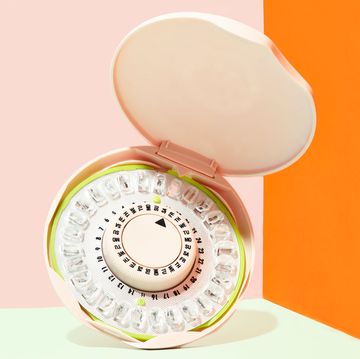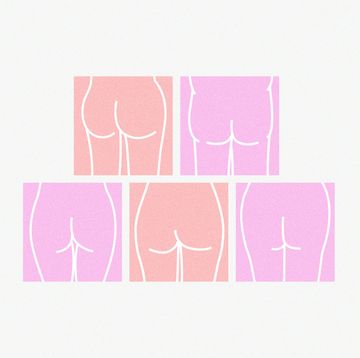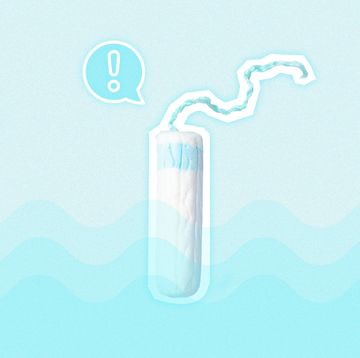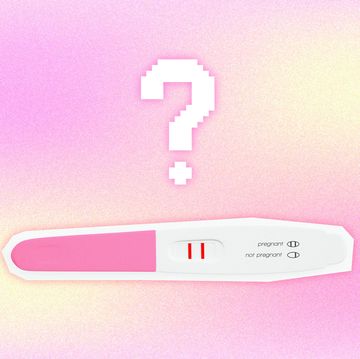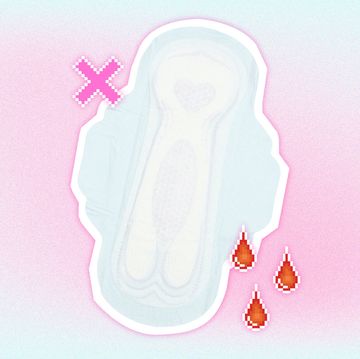The first few times you get your period, it’s totally normal to feel caught off-guard. (But, ofc, not ideal.) In fact, irregular periods are super common in the beginning. Your body isn’t ovulating yet (i.e. the process of releasing an egg for fertilization) and still needs time to adjust to a regular cycle. But there’s some good news. Although your menstrual cycle can be unpredictable, there are some signs to look out for that can mean your period is coming soon. Because let’s face it: No one wants to be surprised by their time of the month, especially the day before vacation, prom, a first date, or any big event.
Periods are triggered by a drop in hormone levels in your body, specifically estrogen and progesterone, Dr. Anita Somani, board-certified OB/GYN, explains. While it’s tough to pinpoint signs that your period is coming exactly tomorrow, there are a few symptoms that may pop up a few days before bleeding begins. “You may experience physical and/or emotional symptoms 2 to 3 days before your period starts,” Dr. Somani says.
You’ve maybe heard the term “PMS” before, which stands for premenstrual syndrome. These are the physical and emotional symptoms you may feel right before your period. “Pre-period symptoms like breast tenderness, nausea, bloating, irritability, and cramping are solid clues that your period is near,” Dr. Charis Chambers, board-certified OB/GYN known as @ThePeriodDoctor, explains. Some people experience pre-period symptoms all the time, while others feel them every now and then. It’s also common to not feel anything at all right before your time of the month (this is where a period tracker or calendar might be helpful).
There are tips and tricks to ease the pain of pre-period symptoms. But one of the best courses of action is to be prepared. Keep reading for the common signs your period is coming tomorrow (or soon, at least) and expert-approved remedies to curb any discomfort.
Breast tenderness
Your boobs might feel extra sensitive or even a bit sore in the days leading up to your period. Why? Well, Dr. Chambers says, this is typically due to changes in the levels of two hormones: estrogen and progesterone. “When our hormones decrease right before our period begins, this change causes breast tenderness,” she explains. During your period, estrogen and progesterone prompt your breast ducts and lobules (also known as milk glands) to enlarge, which can cause swelling.
Taking an over-the-counter pain reliever like ibuprofen (aka Advil) or paracetamol (aka Tylenol) could help alleviate the soreness, as can a cold compress or heating pad (whichever feels best for you) and a comfy, supportive bra, according to the Mayo Clinic.
Cramping
Ah, cramps: The bane of most of our existence during that time of the month. The pain, which usually persists in your abdomen, lower back, and thighs, can range from a dull ache to a sharp sting, but no matter how severe the discomfort, it’s one of the worst parts of having a period.
“Period cramping is primarily caused by inflammatory chemicals called prostaglandins that are released by the uterine lining right before our period begins,” Dr. Chambers explains. These prostaglandins act on the uterine muscles, which cause contractions, i.e. cramping. The higher the level of prostaglandins, the more painful the cramps.
“The amount of prostaglandins is highest at the beginning of the period and lessens the days after,” Dr. Chambers adds. “This is why cramping is typically worse on period days 1 to 2, and improves on days 3 to 7.” Heating pads are your bestie.
Nausea
Another common PMS symptom is nausea, which may be exacerbated by headaches or severe cramps. Rising levels of prostaglandins are to blame once again. Staying hydrated, getting fresh air, taking over-the-counter anti-nausea meds, and eating bland floods (like crackers, toast, bananas, chamomile, ginger, and peppermint tea) should help, per the Cleveland Clinic. If the problem persists or grows worse, make an appointment with your OB/GYN. Some conditions, such as endometriosis and pelvic inflammatory disease, can cause severe nausea, according to the Mayo Clinic.
Bloating
Bloating is the result of hormone fluctuations and inflammation, Dr. Chambers explains. “Once the drop in progesterone occurs, our uterine lining begins to release prostaglandins,” she notes, referring to those pesky inflammatory chemicals that also cause uterine muscle contractions and cramping (see above). This inflammation leads to fluid retention, Dr. Chambers continues, which is why you feel bloated and puffy right before your period starts. Drinking lots of water, avoiding caffeine, reducing your salt intake, and applying ice and heat can help tackle the problem, the Cleveland Clinic reports.
Acne break-outs
Hormonal acne is definitely (and unfortunately) a thing, due to decreased estrogen and progesterone levels. A drop in these hormones can trigger your sebaceous glands (small glands in the skin) to produce more sebum, an oily substance that clogs pores and causes breakouts. Opt for face washes and spot treatments with acne-fighting ingredients such as alpha and beta hydroxy acids, and glycolic and salicylic acids. These help exfoliate the skin and promote cell turnover. Your pimples won’t stand a chance.
Irritability
You not only experience physical symptoms before your period, but emotional ones, too. It’s totally normal to feel a bit more irritable, moody, or tense before bleeding — in fact, Dr. Chambers notes that irritability is the most common premenstrual symptom. “It’s felt to be due to hormonal fluctuations, as changes in our hormones are well known to affect our mood,” she explains.
Thicker discharge
Vaginal discharge helps keep your down-there area clean, balanced, and lubricated— and it can even signal that your period is coming. “Discharge changes throughout the menstrual cycle because of hormone changes,” Dr. Chambers says. “Right before your period, discharge tends to be thicker and white.”
Leah Campano is an Associate Editor at Seventeen, where she covers pop culture, entertainment news, health, and politics. On the weekends, you can probably find her watching marathons of vintage Real Housewives episodes or searching for New York City’s best almond croissants.





